Pickle the Spy
Parts 1 and 2 explored the possibility that royal authority-seats may not be as insignificant as we are led to believe. We are observing that intelligence agencies appear more connected to royal families than we’ve previously understood, and that intelligence officers move seamlessly between agencies and private contractors. For instance, we learned that Hakluyt works closely with GCHQ, and that it was founded by Mi6 spies. These public-private partnerships in the world of intelligence are now so pronounced, that many are suggesting that intelligence agencies have been weaponized against their own people.
We’ve learned, as it was in the days of the Prussian empire, that Ambassadors, Dukes and Chancellors still play some role in gathering intelligence about other nations; or at the very least, they perform a role of ‘commentating’ the leadership-performance of other leaders. We’ve also learned that the main stream media is far more connected to this global intelligence apparatus than anyone truly realized.
Finally, we’ve learned that blackmail is not a thing of the past; aligning with criminal networks still remains crucial to gather intelligence; and that deception is still the main game in town. The genius of Frederick the Great seems to remain alive, even today.
Infiltration instead of invasion:
Frederick the Great was known for his espionage prowess. To be fair, he was so proficient, even the history books are not clear on who his spies actually were. He truly was the master of infiltration. To be good at infiltration, you must also be good at spying. The two disciplines go hand in hand.
The era we shall now revisit is the early-to-mid-1700s. The Hanseatic League Merchants are still consolidating their roles in London following the rule of William III of Orange and the creation of the Bank of England in 1694. Such significant transitions were always tumultuous. Scotland, England and Wales were all finding their place in the emerging “United Kingdom”. In the early years of this transition, Great Britain consisted of England (which included Wales) and Scotland. It was not until the Seven Years War that broader alliances were established that define the United Kingdom, as we know it today.
As #PrussiaGate readers have come to expect, if there was a transition of power happening in Europe, Frederick the Great was in the middle of it all; and if Frederick was involved, infiltration was involved. Frederick wasn’t just the king of Prussia; he was the king of espionage.
The Seven Years War started poorly for Britain, suffering from the plague and scurvy, and they were also in conflict with France in North America. Britain’s major ally, Austria, had switched sides and aligned itself with France, resulting in Britain hastily forming a new alliance with Prussia.
The espionage taking place during this era is magnificently recorded in the book:
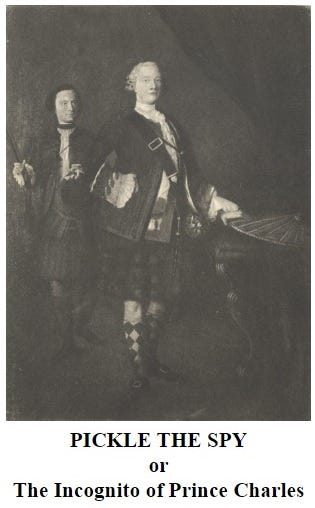
The following screen shots are taken from this book which pieces together the Stuart Papers from the archive-library of Windsor Castle, the State Papers, the Pelham Papers, as well as numerous letters and correspondence from Monarchs and Ambassadors of the time. The writer also acknowledges that, “the political correspondence of Frederick the Great also contributes to the effect”.
The book’s source documents do not just include these previously inaccessible royal documents and letters; they include the writings of Pickle the Spy.
Pickle the Spy was very well known by the kings and confidantes of most European nations. These collective works assembled by Andrew Lang, unlock an incredible story about trade, monarchs, unity, war, infidelity and espionage.
The early decades that defined the birth of the United Kingdom were marked by the Jacobite risings. These unsettled times culminated in the Battle of Culloden in 1746, and essentially ended any chance for the restoration of the House of Stuart, following the earlier death of Queen Mary II in 1694. This battle also began the weakening of the powerful Jacobite movement. Just seven years later, in 1753, Frederick the Great understood the terrain as well as anyone. As the Hanseatic Merchants continued to exert power, it was not surprising that the issues at hand revolved around trade and shipping. Frederick’s felt that the British Crown wasn’t meeting his requirements to resolve the conflict around some Prussian ships being seized. The broader context was that Scotland had been trying to regain the British throne and a possible French invasion was on the horizon. Knowing the Jacobites were supporters of the House of Stuart restoration, a small group were still ‘active’ in challenging the status quo, Frederick could already see the advantage of holding a trump-card:

Frederick’s infiltration, or “tampering”, with the Jacobite’s (or “disaffected Highlanders”) in order to expand the Empire of Prussia, was being directed very carefully, by Pickle:
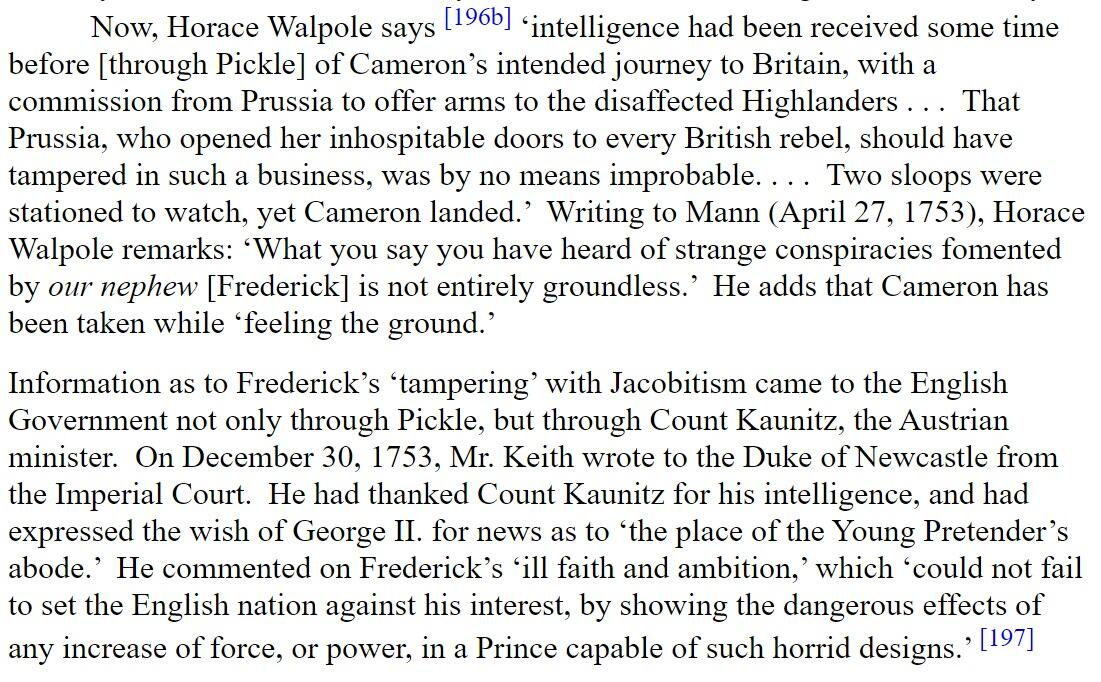
Pickle is front and centre, but he is informing the English government. Questions about his true allegiances are not far away, though. Frederick the Great learns about the opportunity for deep infiltration and sets up an intermediary to ensure they will “correspond through others”. In typical Prussian style, it is the Ambassadors, Earls and Dukes who do the dirty work. Still unsure about the security of direct information flows, Frederick requests that the British military is to be “tampered” with, or infiltrated:
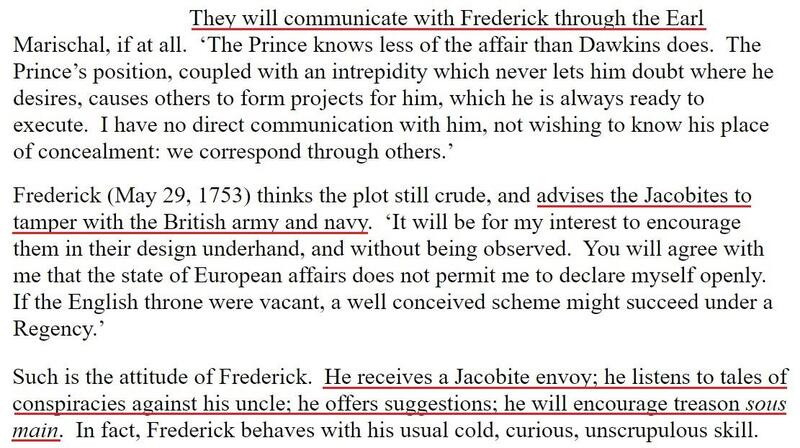
Now, what on earth could have led to Frederick thinking he could carry-out such brazen infiltration in 1753? A discovery in 1749 provides the likely answer:

This monumental discovery made it known that Prince Charles was a leaker; he was a spy! The only question The Establishment of the day had, was what had leaked and how long had the leaks been happening. It also seemed that Prince Charles had found an ally in Pickle:
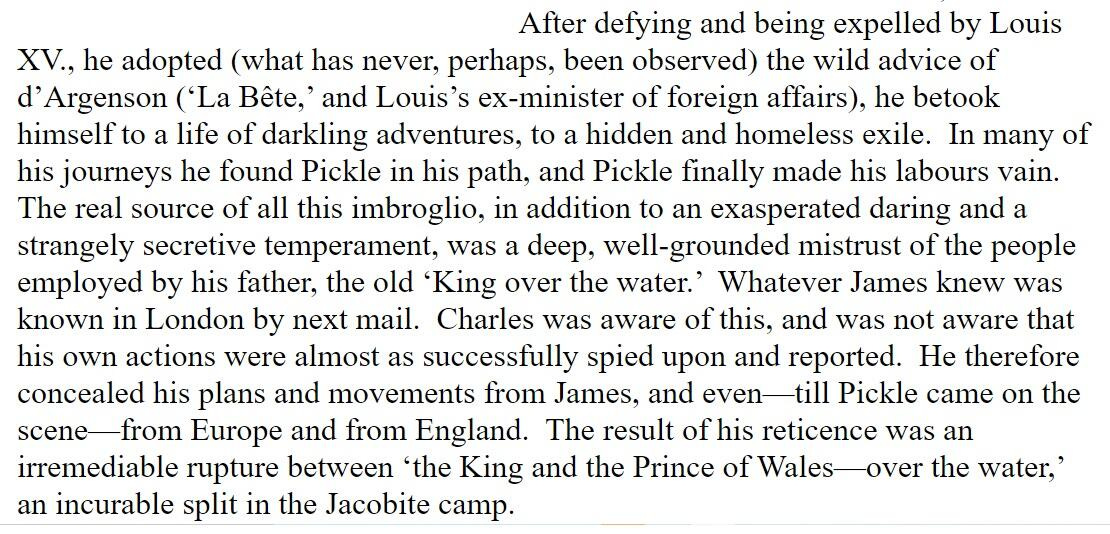
Pickle had developed quite the reputation, even to the degree that he could forge the King’s name. Indeed, his loyalty was already being discussed as with the House of Hanover, which grew out of the House of Brunswick-Lüneburg, which we showed in Evolution of Slavery Part I was essentially the reincarnated Hanseatic League, who indirectly ruled Britain for 200 years. For this, Pickle the Spy was imagined as being engaged in double treason:
https://truthtrench.org/?p=3687&preview=true.


Knowing that Prince Charles and Pickle were now connected, the English Government issued a bounty:

On June 26, 1749 Lord Hyndford was writing to the Duke of Newcastle, advising of the whereabouts of Prince Charles, which he believed to now be in Poland. Obviously supporting the plan for Charles’ assignation, Lord Hyndford suggested “to send him to Serbia” which appeared to be an 18th century version of catching the “Arkansas flu” or being “Arkan-cided”, Clinton style. He wrote:
… I have been with the Chancellor… he told me that he had received a second letter from Mr. Gross, wherein that minister says that the Young Pretender [Charles] had left the country house where he was, in the neighbourhood of Berlin, and had entirely disappeared… it is generally believed that he is gone into Poland… I am sorry that the Russian troops are not now in Poland, for otherwise I believe it would have been an easy matter to prevail upon this Court to catch this young knight errant and to send him to Siberia, where he would not have been any more heard of…
… it is very probable that the King of Prussia has sent him into Poland to make a party and breed confusion.
The assignation plan was foiled, because the master of espionage had already perfected the art of a “disinformation campaign”, and he was aware that ambassadors are the ones who do the dirty work. On this occasion Frederick deceived the Austrian ambassador:
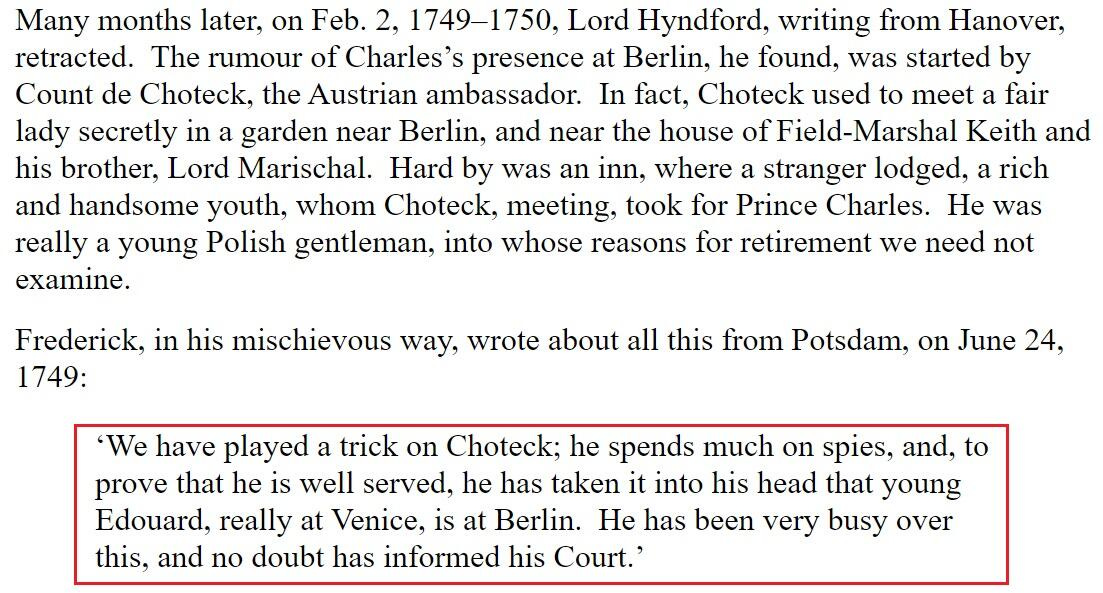
The plot to kill Charles was multi-national. The ambassadors from nearby countries were all involved in this plan to assassinate the prince. The entire setup was eerily similar to the 2016 plot involving Ambassador Downer and the UK spies trying to remove Trump from office, which we outlined in Part 2.
It may never be fully proven who Pickle the Spy really was. However, this masterful research, carried out by Andrew Lang, having been granted access to the Buckingham Palace library, concludes that it is ‘Alastair Ruadh Macdonnell’, the son of John Macdonnell, twelfth of Glengarry. Lang notes that Pickle himself, till his father’s death in 1754, is always spoken of as ‘Young Glengarry.’
Frederick’s protection of his spy is magnificent; Pickle’s ability to remain invisible is masterful; Pickle’s capacity to engender respect from kings and diplomats is sublime. Pickle the spy’s legacy is quite incredible. It must be said that: To be written about in private royal letters, that have been hidden from the public for centuries, is truly the work of greatness.
Could international espionage ever again reach the heights of Pickle? This series is revealing that it quite possibly may have.
Pickle’s covert operations may never be better acknowledged than in the following letter from Mr. Cromwell, the Court Trusty, in 1754. Cromwell had accompanied Pickle to Scotland; a spy with a spy. This letter reveals that Cromwell’s association with Pickle was being noted by Army Generals and that Pickle was incredibly well revered by the “Army people”:
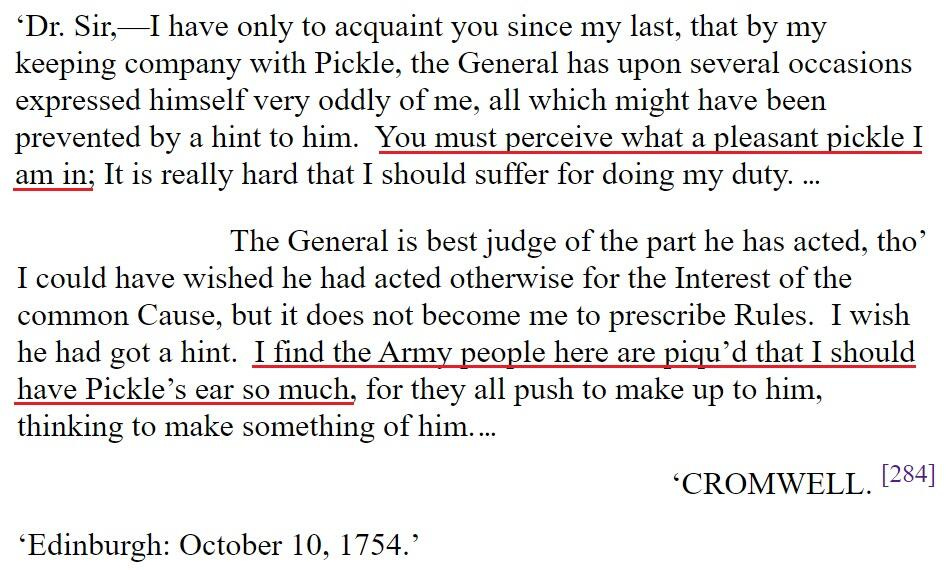
Pickle’s endearing persona and unusual code name saw Cromwell introduce ‘pickle-speak’ into the international espionage game, when he quipped:
“You must perceive what a pleasant pickle I am in;”
Pickle-speak:
For those of you following #PrussiaGate closely, we hope you will understand what an absolutely joy it was to find a legendary spy, going by the name of Pickle, who was also affiliated with Frederick the Great, the King of Prussia. This discovery was even richer because we already knew that the long-standing nickname for the US Central Intelligence Agency was the ‘pickle factory’:
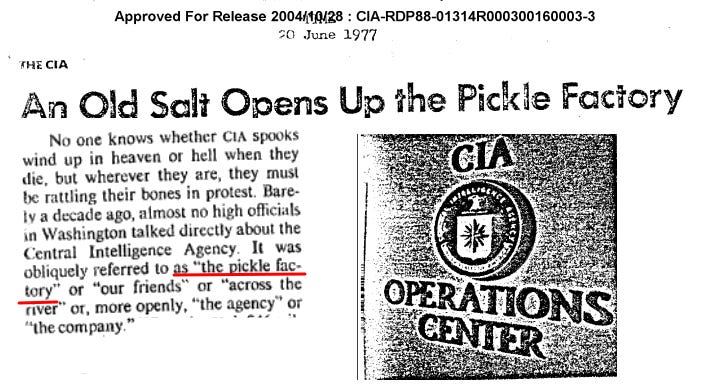
https://www.cia.gov/readingroom/docs/CIA-RDP88-01314R000300160003-3.pdf
The origins of the name could be from the instigation of the Presidential Intelligence Checklist, or PICL, however, what’s more interesting is the possibly that the horrible invisible enemy actually does appear to send messages using ‘pickle-speak’. Sometimes, double meanings exist.
To set the stage, we need to provide some context. Also remember our assertion that the invisible enemy considers the world as a trade network, and seems intent on having all cargo and all movements monitored by its intelligence agencies. Within this overall context, let’s look at the connections between the EU and Iran, as an example:

Knowing Iran’s pending accession to the World Trade Organization makes these 2019 sanctions by Trump on Iran far more interesting. It is possible that all Trump’s new sanctions are destroying the Prussian’s credit-fuelled trade networks?
Supporting this possibility, France, Germany and the UK immediately created a new special purpose vehicle to bypass the newly-imposed US sanctions:

The EU now has a non-USD and non-SWIFT way of trading with Iran. Trump then responded in January 2020 with his own initiative via “Executive Order on Imposing Sanctions with Respect to Additional Sectors of Iran”.
This article will not explore the detail of this EO, but suffice to say, there is anecdotal evidence here revealing the invisible war Trump is waging against the globalists; and trade is a huge part of Trump’s offensive.
It has been the style of the #PrussiaGate articles to go back in history, in order to understand the times we are in. On this occasion, we only need to go back to the period around Trump’s election. We can observe that in October 2017, German Foreign Minister, Sigmar Gabriel was extremely upset about the Iran sanctions, even stoking the nuclear fear fire:
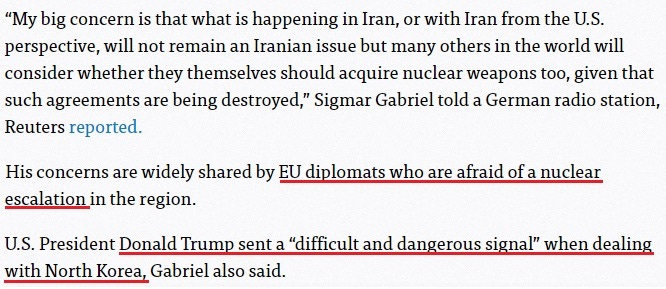
One year earlier, in October 2016, we also see signs of panic, just before the Presidential election. Why were the globalist’s worried? Because Trump was questioning The Transatlantic Trade and Investment Partnership (TTIP).
The media launched their assault, espousing the benefits of globalism, but they structured their attack in an extremely unique way:
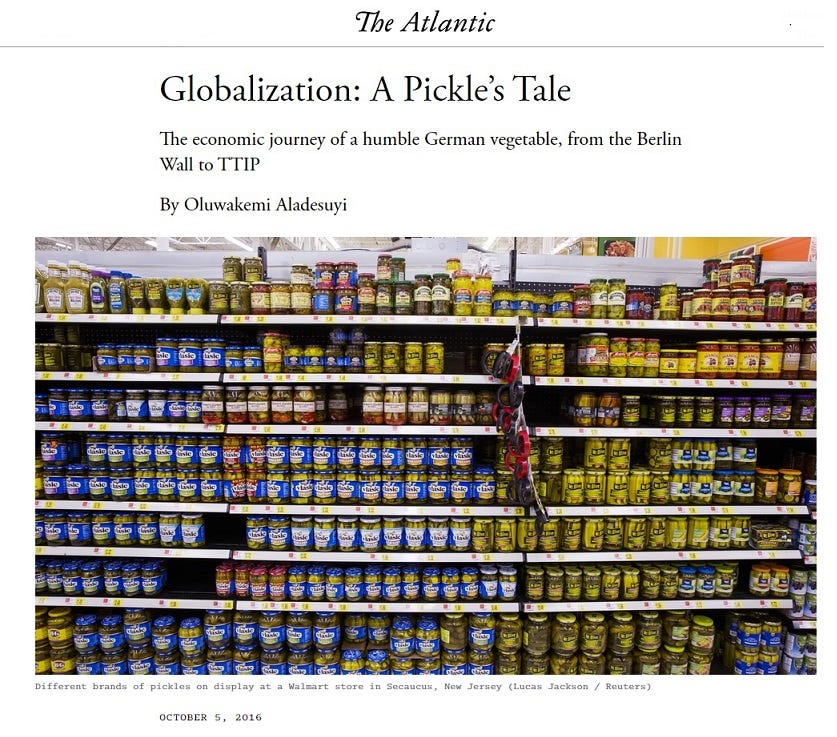
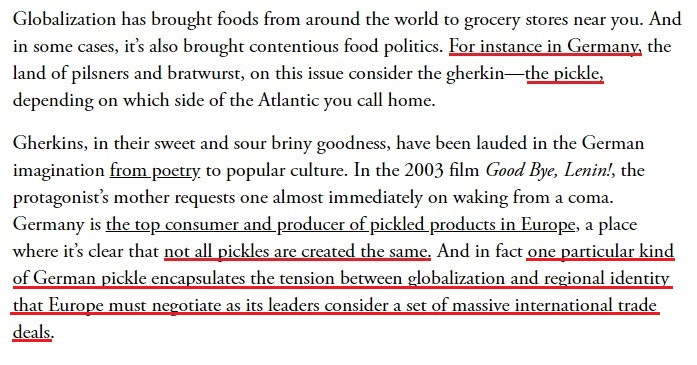
The article concludes that the German pickle may have an “uncertain future” if Obama can’t finalize the Trans-Atlantic Trade Partnership during his term:
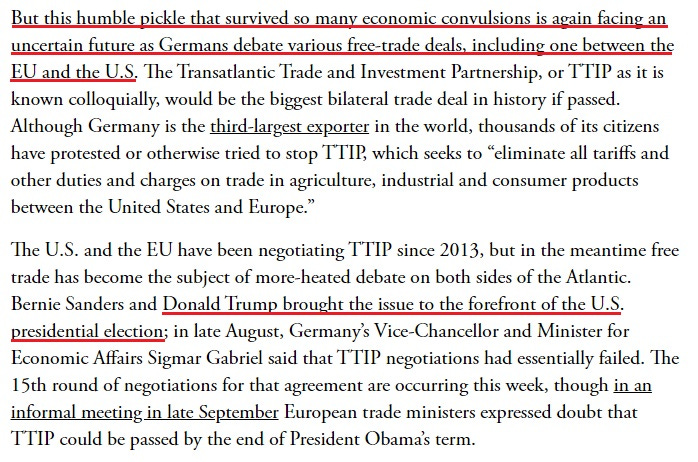
The Atlantic article went on to focus specifically on the Spreewald pickle, and provided a very specific link:

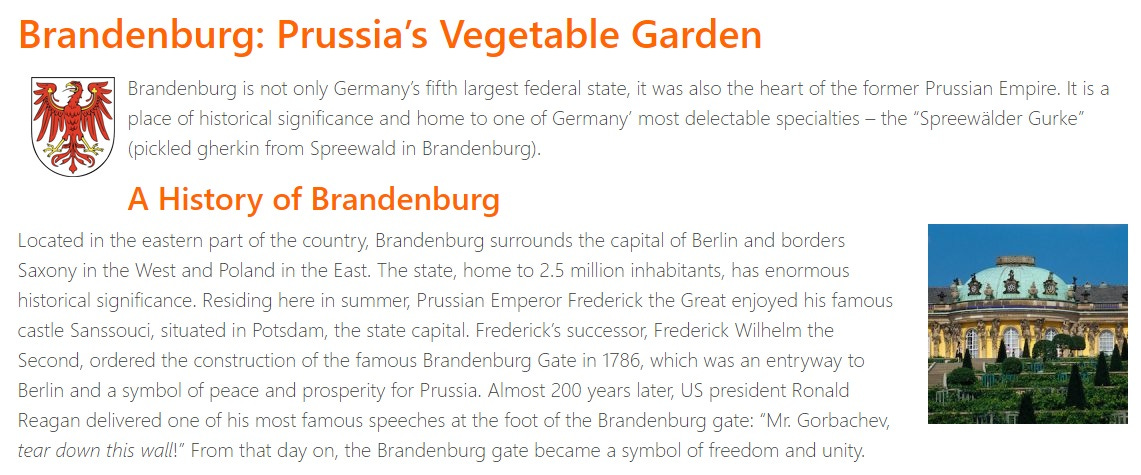
From researching trade partnerships in the EU and Trump’s Iran sanctions, I have now learned that “… not all pickles are created the same.”
Is the Enemy in a Right Royal Pickle?
During this series, we’ve learned about the British Royals being heavily involved in global espionage and whatever else these spy networks might entail. We’ve learned of King Charles’ bloodline connection to Dracula and his family’s deep involvement with GCHQ. We’ve learned that the largest intelligence agency in the world is called the Pickle Factory.
One is compelled to ask what on earth the Pickle Factory may be. One is also compelled to ask why everyone seems to be in a ‘right royal pickle’, since Trump arrived on the scene:
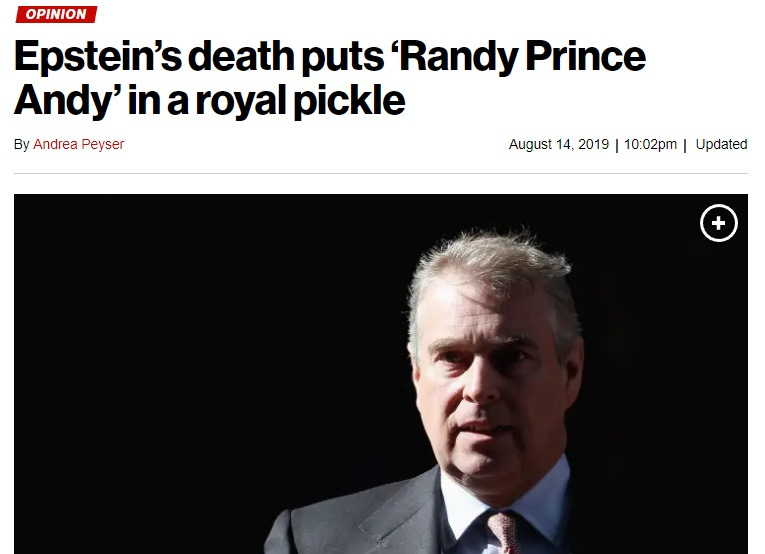

https://nypost.com/2019/08/14/epsteins-death-puts-randy-prince-andy-in-a-royal-pickle/
The exit of Prince Harry and Megan from the royal family has also captivated the news:
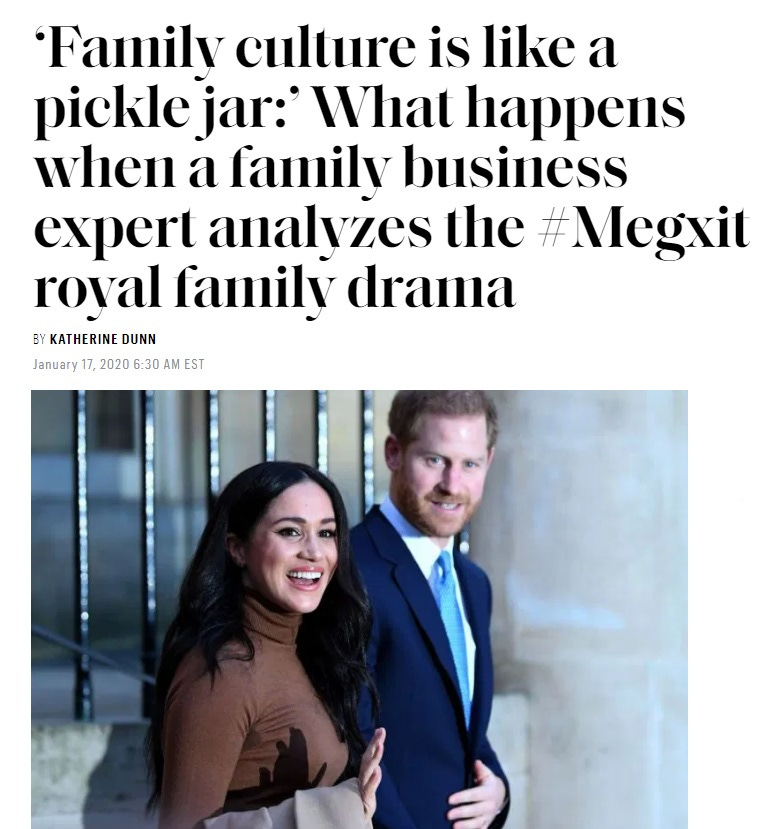

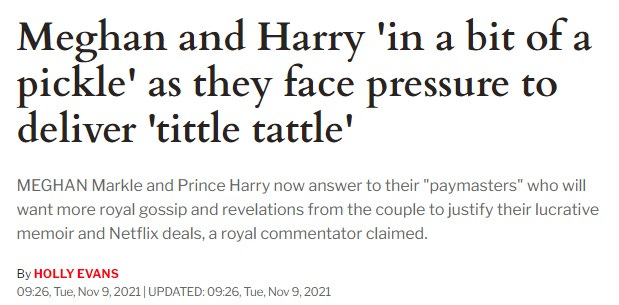
When President Trump was asked about Prince Harry and Megan’s interference in the US election, his response was extremely intriguing. His answer carried a sense of foreknowledge and confidence that royals truly are in a pickle: (0:28 seconds)
https://www.youtube-nocookie.com/embed/1UHyIpc-Law?rel=0&autoplay=0&showinfo=0&enablejsapi=0
The pickle references in the media were also being rolled out for another high-profile case. There is little to no chance, that these unusual headlines around such a world-famous case are the accidental work of random journalists:
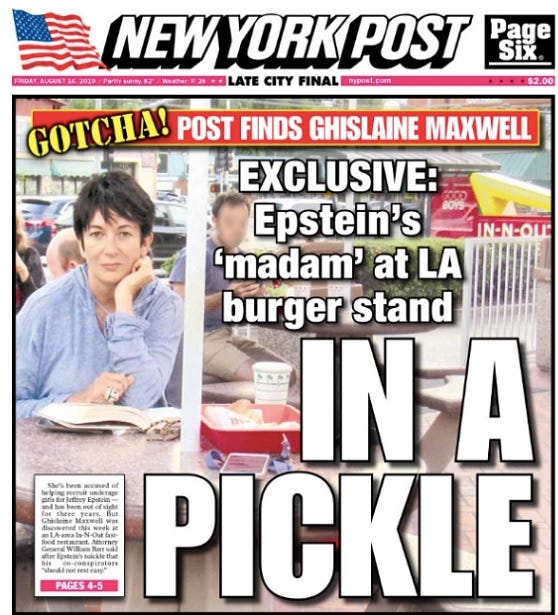
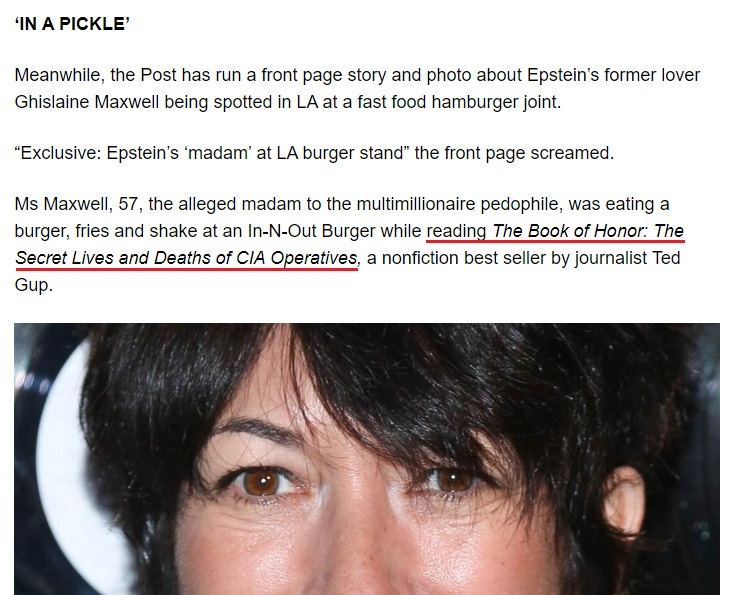
Call me a conspiracy theorist, but having Ghislaine Maxwell headlined as being “in a pickle” while reading a book entitled “The Book of Honor: The Secret Lives and Deaths of CIA Operatives”, when we’ve now learned that the CIA is nicknamed The Pickle Factory, is a little more than coincidental. This is all becoming somewhat compelling. The reason it is just so hard for people to believe, is because it is so bloody ‘unbelievable’!
One could even contemplate that Trump may be helping to expose an ancient and elaborate spy network!
Even the recent death of Queen Elizabeth II had an interesting message on the hearse, which sent the world into a tail-spin:
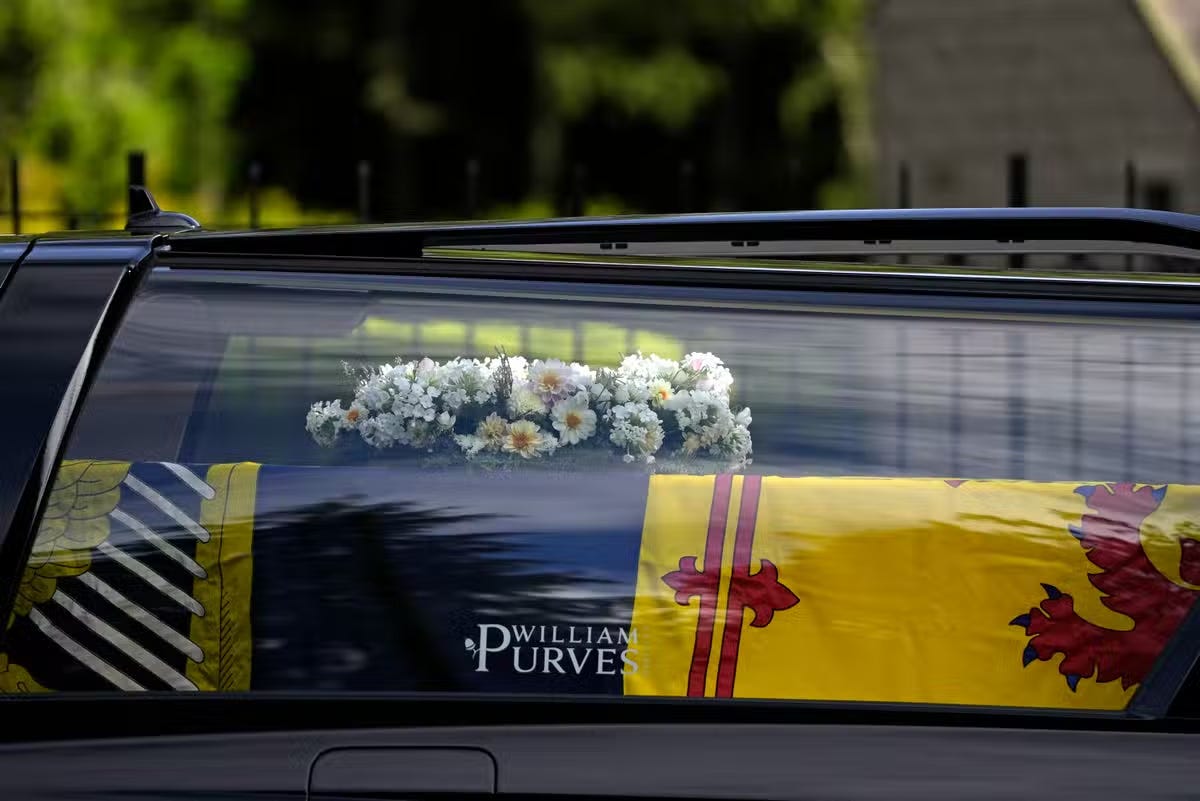
Most people considered it highly-inappropriate that the name of the funeral company was left on the car for such a high-profile event. The royal family quickly removed the name from public photographs. This funeral happened during our research into the Pickle the Spy, meaning we already had a lazer-focus on key players in the UK spy game.
Did you know that there is another William Purves, and that he has been knighted?

Just so we are not moving too quickly: The Queen’s Hearst carried the name of a famous UK spy who had previously been chairman of Hakluyt; who had been knighted; who had previously been a director of Shell Transport; and who is a member of the1001 Club. …and one last thing – Hakluyt and Shell had a very close relationship, and Hakluyt had been spying for Shell, against its corporate enemies, which included Greenpeace.
With so many oddities around pickles and spying, we just had to look closer at this 2005 event featuring the global head of the invisible enemy’s espionage division, Prince Charles:
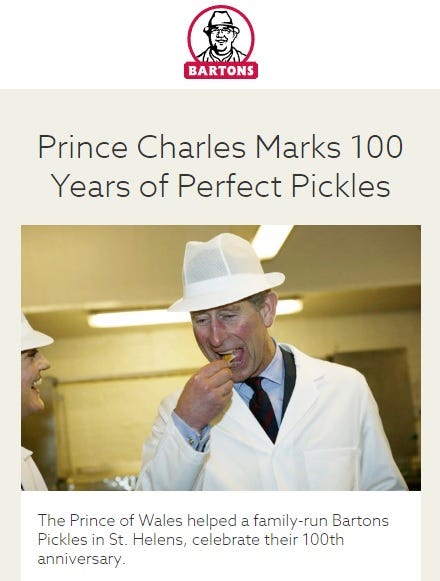
This is not to disparage Bartons Pickles in St Helens by any means, as I’m sure they are probably just a solid family enterprise, founded by UK’s Edmund Barton in 1905.
What is of interest to our research, is why such a significant figure-head would celebrate a random UK pickle business. What about all the other businesses in the country? Could the centenary celebration be about something else, as well as the Barton Pickle company?
Incredibly, the first Australian Prime Minister was also named Edmund Barton following Australia’s Federation in 1901, where the six separate British self-governing colonies (states) agreed to unite and form the Commonwealth of Australia.
What is even more interesting, is the fact that Sir Edmund Barton oddly resigned from being Prime Minister in 1903, having just been knighted in 1902, and that he was replaced by Alfred Deakin of the Liberal Protectionist Party. Deakin was the leader who had pushed for Federation prior to 1901. His appointment took ground away from the “Free Traders” who were a rising political force at this time. The Free Trade Partyadvocated the abolition of protectionism, especially protective tariffs and other restrictions on trade, arguing that this would create greater prosperity for all.
Between September 1903 and July 1905, Australia had four different Prime Ministers. The issue causing so much tumult was the establishment of a Commonwealth jurisdiction over all of Australia, and free trade, of course. The stakes were very high for the Commonwealth, because Australia is exceptionally rich with natural resources. The Free Trade Party did take government very briefly, however, in 1905, Alfred Deakin, the Commonwealth’s Federation man, was returned to power for a 3½ year period, which was the first meaningful period of stable government in Australia. The freedom movement was effectively quietened and ‘sent to the back of the room’. The mercantile policies of the British Empire could continue unabated.
The British colonies had been tricked into thinking they now had control, but it was a classic Prussian paper shuffle; all taking place during the window of 1871 – 1917. Edmund Barton and Deakin were close friends and they were leaders of the Protectionist Party. They each played a critical role in the transfer of power from the states to the Commonwealth, finally being established in 1905. Self-governance within the land of Australia had been brought-to-heel under Commonwealth rule.
Was this the real centenary celebration of Barton’s pickles? Does the invisible enemy celebrate publicly, without us ever really knowing what they are talking about? Are these obscure public disclosures all part of the contract-offerings that this ruling monarchy makes to us, ensuring the legality of our ongoing enslavement?
We will likely never know the truth of what Prince Charles was revealing at Barton’s Pickles, and maybe he was just celebrating a good local business. It is certainly another strange coincidence though, amidst many others.
A final thought:
Learning about the CIA pickle factory and reading a book titled “Pickle the Spy” helped us find an unusual children’s adventures book – centred around Adolph’s deli, if you don’t mind:
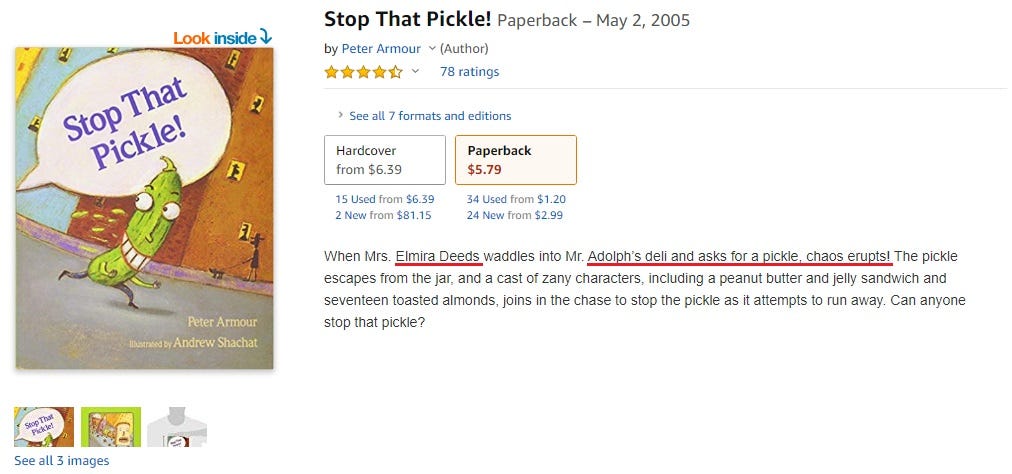
Part 2 touched on some nasty topics about paedophiles circling around the royals and spy agencies. None of us want to think about these things, however if they present themselves as a threat to dignity, freedom and human-decency, then it must be addressed. Let’s hope that the humble pickle is just used for spy-comms, and nothing else.
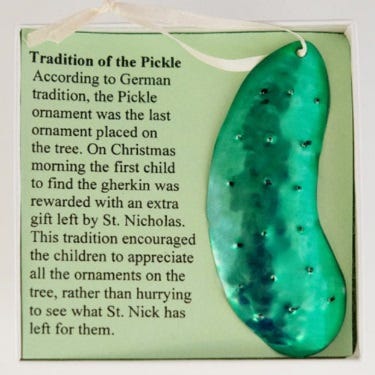
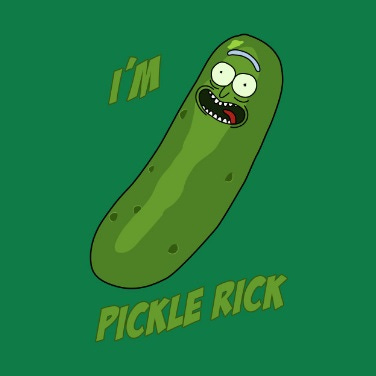
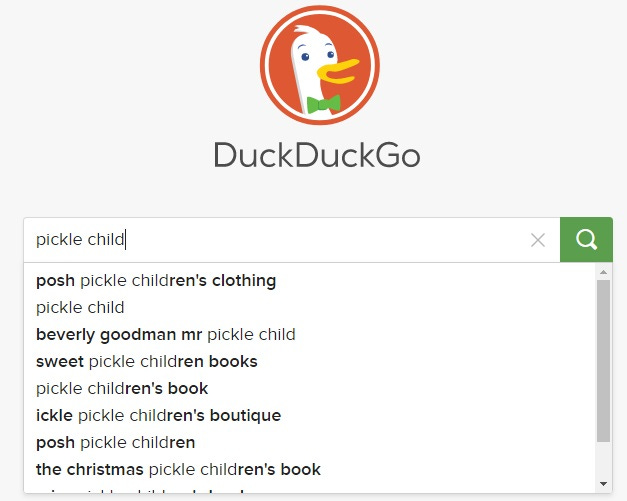
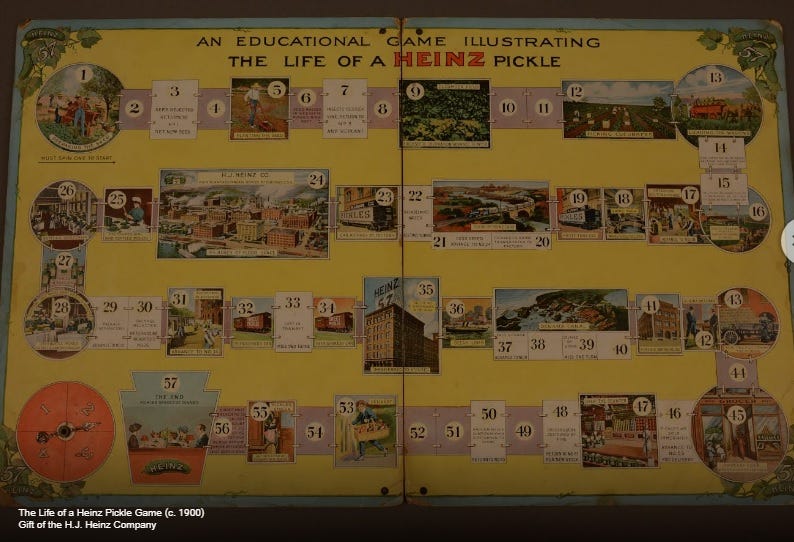
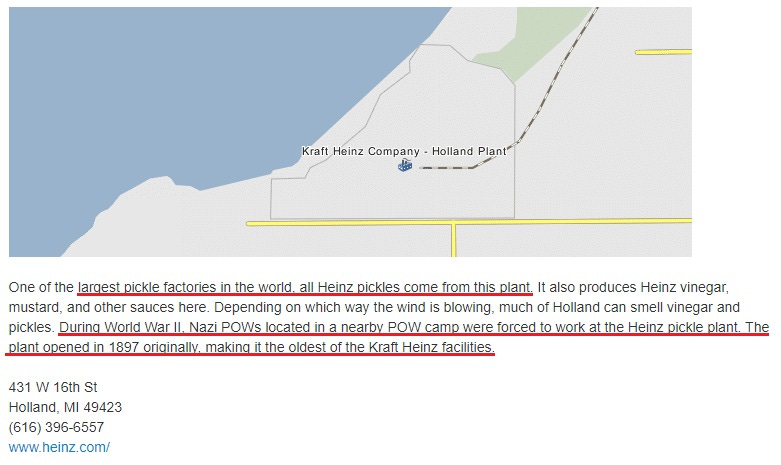
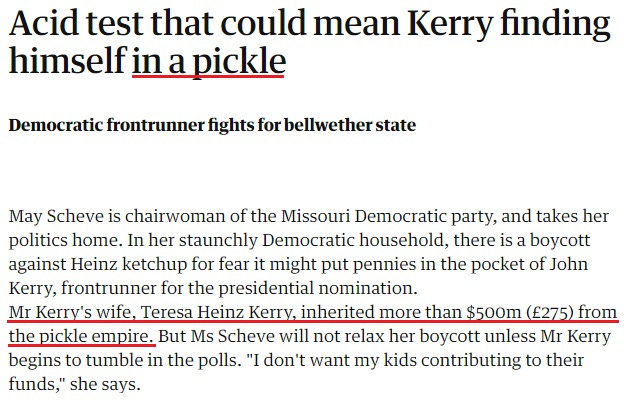

When you are not a part of a secret club, it is almost impossible to know what goes on behind their closed doors. This is no small local club though; this secret club is global; and have members who are royals; members who are ‘elected’ world leaders… and members who are spies. Pickle the Spy is revealing that the distinctions between royals and spies is quite blurry!
The general population are certainly not invited into these clubs. We are simply presented with never-ending reams of bizarre headlines and unlikely coincidences. One such coincidence relates to the namesake of Pickle’s partner-in-espionage in 1750, Prince Charles. Carrying on a long tradition of spying, King Charles III became the first Royal Patron of all UK intelligence agencies in 2011, which was the same year that the GCHQ spies set up the Masonic Lodge Paedophile Information Exchange (Pie) which we noted in Part 2. I’m sure it’s just another coincidence though…
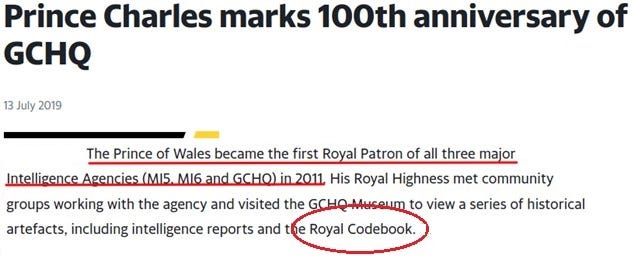
Without the advantage of seeing what is in that good-old “Royal Codebook”, We the People, remain largely ‘in the dark’ about what meanings may sit behind all these unusual headlines and unsettling alliances.
To be continued….
ADDENDUM – A funny add-on:
For spies, everything is about infiltration. Remember that Prussia never owned states; it controlled them. Head wear often symbolises the authority under which you rule. It was appropriate then that an army’s military headwear made a powerful statement. For this reason, we found it highly amusing to find that the military helmet used by Prussian officers and Generals (who swore allegiance to the Kaiser) was known as a ‘Pickelhaube’. (H/T to subscriber L.C. on Substack.com who pointed out this funny coincidence.)
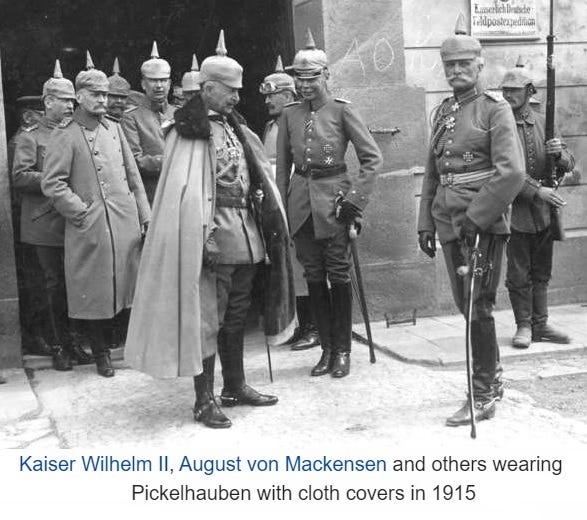
It is now a famous and impressive military head-dress, as well as being highly recognizable.
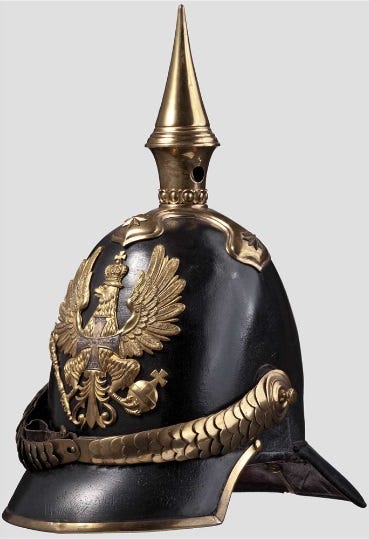
Regardless, the ‘Pickelhaube’ represented a military officer’s allegiance and loyalty to the Kaiser, the king of Prussia, and the princes of Orange. Coincidence?
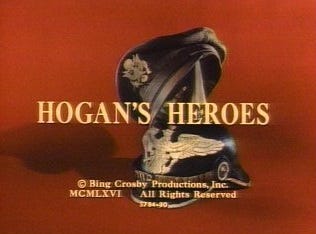
https://www.gutenberg.org/files/6807/6807-h/6807-h.htm
https://en.wikipedia.org/wiki/Iran%E2%80%93European_Union_relations
https://en.wikipedia.org/wiki/Instrument_in_Support_of_Trade_Exchanges
https://www.politico.eu/article/sigmar-gabriel-donald-trump-iran-deal-move/
https://www.theatlantic.com/international/archive/2016/10/globalization-a-pickles-tale/501398/
https://germanfoods.org/german-food-facts/brandenburg-prussias-vegetable-garden/
https://fortune.com/2020/01/16/meghan-harry-royal-family-business/
https://wikispooks.com/wiki/William_Purves
https://digitalholland.org/around-town/h-j-heinz-pickle-factory/
http://rutherfords.us/emuseum07/POWs/Heinz_Pickle_Factory.html
https://www.express.co.uk/news/uk/579523/Paedophile-Mason-lodge-GCHQ
